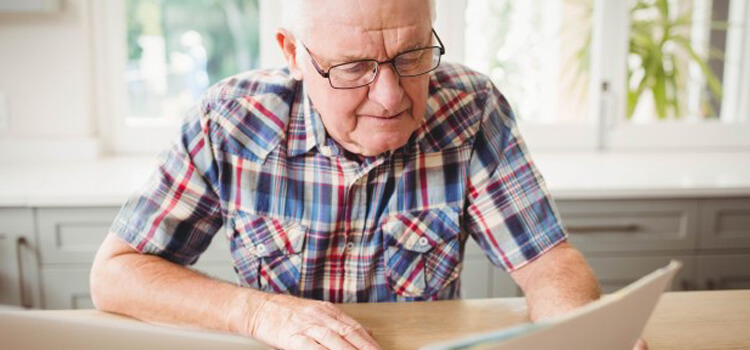Do you have an elderly person in your life that you love and appreciate? August 21st is National Senior Citizens Day; first declared a holiday by Ronald Reagan in 1988. The day was created to show the older generations our appreciation and recognition of their accomplishments.
It goes without saying that senior citizens have contributed so much to our homes, our families, and our communities. Changing demographics due to improved healthcare have increased the life expectancy of senior generations to far surpass previous generations. According to statistics gathered by the American Hospital Association, by 2030 there will be more than 37 million people over age 65 in the United States. Seniors are living longer, healthier, and more productive lives, which begs the question “What’s trending in senior citizens’ health?”
Senior Health Trend # 1: Medicaid Planning (Proactive Planning)
Proactive Medicaid planning can be a very useful tool for seniors who may be faced with the future need for nursing home care. Nursing homes are tremendously expensive and can eat up accumulated assets quickly. Our elder law attorneys employ legal and ethical methods that will transfer your assets so that you may qualify for Medicaid later in life. Once a person becomes eligible and is accepted by Medicaid, certain at-home nursing care and nursing home stays will be paid for by Medicaid. The most common method for Medicaid planning is by creating a Medicaid Asset Protection Trust.
A Medicaid Asset Protection Trust is an Irrevocable Trust. You, as the “Grantor” create the Trust, fund it with certain assets, and name an individual “Trustee,” other than you or your spouse, to manage the Trust. You can specify exactly how the assets should be managed and you will be entitled to all of the income for the rest of your life. The principal of the Trust assets will remain in the Trust until your death. When you pass away, the Trust assets will pass directly to your designated heirs. A great benefit to this Trust is that your heirs receive the assets without going through the probate estate administration process with the Court.
Senior Health Trend # 2: Skype to Help Battle Loneliness
A major concern regarding senior health is social isolation. As family members move away, spouses and friends pass on, seniors may begin to feel disconnected from society. Isolation is a key predictor of depression. According to the Centers for Disease Control and Prevention, up to 5 percent of older adults suffer from episodes of major depression, and the numbers rise to 13.5 percent for patients who require home health care and to 11.5 percent in older hospital patients.
Staying socially connected may help. Modern technology affords all of us new ways to stay in touch, and a recent study, published in the American Journal of Geriatric Psychiatry, finds that one technology appears to work better than any other: video chatting. Researchers at Oregon Health and Science University in Portland, Oregon, reviewed four online communication platforms: video chat, email, social media networks, and instant messaging. Their findings showed that seniors who used video chat applications such as Skype or FaceTime had almost half the estimated probability of depressive symptoms, keeping in mind other factors, such as pre-existing depression and level of education.
Senior Health Trend # 3: Coffee for the Brain
Recent research shows that consuming caffeinated coffee on a regular basis may improve mental health and delay the onset of neurodegenerative diseases, like Alzheimer’s Disease (AD), and Parkinson’s. About 26 million people worldwide suffer from AD, and it is estimated that these numbers will rapidly grow in the next five years. Studies note that drinking moderate amounts of caffeinated coffee each day during middle life stages may decrease the chance of contracting Alzheimer’s later in life. Although not conclusive, the study’s findings are very exciting for those of us who worry about AD in ourselves and in loved ones – and especially for those who rely on that first cup of coffee to start the day!
Senior Health Trend # 4: Use of Non-Physician Healthcare Providers
Gone are the days when licensed physicians were the only healthcare providers. With the increasing baby boomer population, the national healthcare conundrum, and decreased in-network payments for physicians, the responsibility for treatment is now shared among a medical team that includes Advanced Practice Registered Nurses (APRNs) and Physician Assistants (PAs).
APRNs have additional training required to diagnose diseases, initiate treatment plans, order tests, and prescribe medication as a doctor would. PAs play a similar role to nurse practitioners but must work under a doctor’s supervision. The availability of non-physician healthcare providers now extends beyond traditional medicine and into integrative and functional medicine practices as well.
Good or bad, the increasing use of alternate types of healthcare providers is on the rise. Seniors will be able to get quicker answers to their healthcare questions, but lose out on the physician-patient relationship that they previously would have developed by relying on one primary care physician.
Senior Health Trend # 5: “Wearable “Fitness and Health Trackers
Wearable technology, such as fitness trackers, are very appealing to the older generations. Seniors are increasingly using technology to monitor vital signs, such as blood pressure, heart rate, respiratory rate, temperature, fitness metrics, and other indicators of overall health.
The sexy and easily accessible high-tech solutions like Fitbit or Polar for health monitoring are prompting increasing numbers of older people to turn to technology.
Senior Health Trend # 6: Telemedicine from Home
Telemedicine enables patients to leverage technology, such as Skype and other video communication software, to consult with their healthcare providers virtually. While some argue that the quality of care available in telemedicine suffers, because the doctor is not physically present, telemedicine has proven useful in limited areas, such as with pre-stroke individuals and in rural areas. Telemedicine can be used anywhere there is a phone or Internet connection. Senior citizens for whom mobility is an issue are gravitating toward telemedicine for many of their healthcare needs.
Senior citizens continue to impact future generations with wisdom and trending health practices, and for what they have achieved and continue to achieve, they deserve our thanks. Contact OC Estate & Elder Law at (954) 251-0332 or info@ocestatelawyers.com to receive a personalized consultation to learn all of the exciting legal trends that directly benefit senior citizens and their families.
















